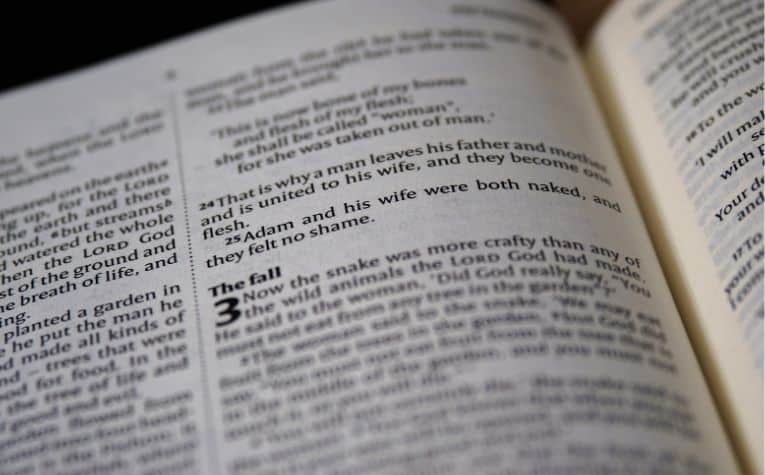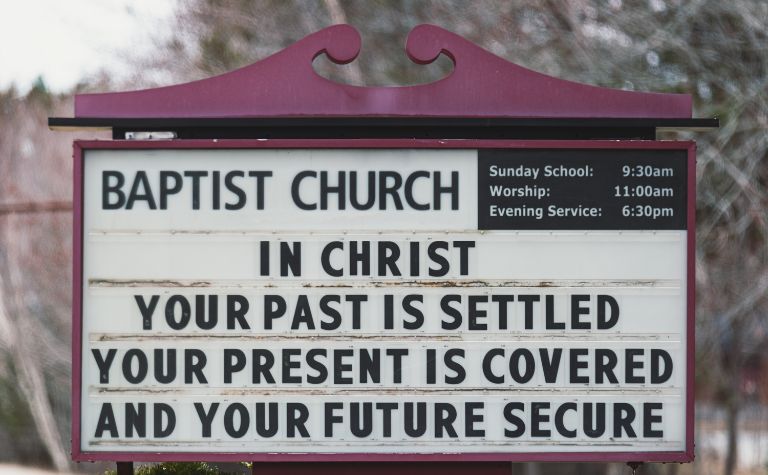The doctrine of mortal sin is a central belief in Roman Catholic theology. It concerns sins that are deemed especially serious and has eternal consequences for baptized members of the Catholic church. Baptists also believe that sin is serious, but do they believe in mortal sin?
Baptists don’t believe in mortal sin, as the Catholic church defines the doctrine. Baptists don’t use the terms “mortal” and venial” or categorize sin in such ways. However, Baptists have a robust understanding of sin that is based on the Bible, including its nature, expressions, and consequences.
How exactly does Catholic theology define mortal and venial sin, and why don’t Baptists hold to these? Keep reading to learn the answers to these questions and more.

What Is Mortal Sin and Venial Sin In Catholic Theology?
In Catholic theology, sins are categorized in two ways: mortal sins and venial sins. Although Catholics believe that all sin is rebellion against God, mortal sins have more serious consequences.
| Mortal sin | Venial sin | |
|---|---|---|
| Seriousness | Most serious | Very serious |
| Awareness | the sinner is aware their choice is sinful; they are not ignorant that the choice is wrong when committing the act | the sinner may not be aware their choice was sinful; they may be ignorant, but the offense is less egregious |
| Consent | the sinner isn’t forced to make the sinful choice but acts on their own accord using their free will | the sinner may or may not have consented, but the matter is less grave in nature |
| Love | mortal sins destroy it | venial sins wound it |
| Grace | mortal sin renders it lost | venial sins render it changed but not lost |
| Punishment | If not redeemed, the consequence of mortal sin is eternal death (see more about penance below) | venial sins require purgatory (see more about confession and repentance below) |
| Penance | The sacrament of penance is necessary for forgiveness | Confession and repentance are sufficient; the sacrament of penance isn’t necessary |
Baptists don’t subscribe to these categories because they don’t see sin described in these ways in the Bible. Mortal and venial sins are descriptions that come from Catholic history and theology, according to Baptist thinking, and reflect tradition more than Scripture.
However, Catholics and Baptists have some overlapping beliefs about sin and those will be described in more detail below. (Also see Do Baptists Believe in Original Sin? to learn more.)
Something many people wonder about Christianity is, Do All Denominations Go to Heaven? Follow the link to learn the answer to this important question.
Mortal Sin: Three Conditions
In order for a sin to be categorized as mortal, three qualifications must be met [1]:
The sin must be of a grave matter:
- All sin is serious, according to Catholic theology. Mortal sins are the most serious, but venial sins are still very serious.
- Often the gravity of a sin is defined using the 10 Commandments. If a sin clearly violates the 10 Commandments and meets the other criteria below, it is considered mortal.
- Baptists believe sin is always serious because its nature is rebellion against God. In fact, sin is so serious that it can lead to eternal death and separation from God (Rom. 6:23).
The sinner must have full knowledge of the sin:
- The sinner must be aware that the act they are committing or the words they speak are sinful and against God’s will. Therefore, people who may not meet the criteria include young children and the mentally challenged. (Also see Do Baptists Believe Baptism Is Necessary for Salvation?)
- Baptists believe that willful disobedience of all sin is especially egregious, no matter who is committing it. Like some Catholics, some Baptists hold to the Age of Accountability, which is a belief that God doesn’t hold the mentally underdeveloped to the same standard as other people.
The sinner must deliberately consent to the sin:
- Being forced to participate in a sinful act doesn’t imply guilt. In order to be a mortal sin, an individual must willfully agree to take part in the rebellious act.
- Baptists believe that those who are forced to commit a sinful act (e.g., rape) aren’t guilty of sin (e.g., fornication or adultery).
What if just one of the three criteria isn’t met? If any of the criteria aren’t met, the sin is considered a venial sin, which is still “very serious,” but not “gravely” serious. Some venial sins have the potential to become mortal sins if, at some point, all the criteria are met. (Also, see Baptist vs. Lutheran: Comparison)
How is a Catholic forgiven of a mortal sin? This is a critical question for Catholics because if one dies in a state of having mortal sin not forgiven, they have no chance of redemption and heaven. A mortal sin is dealt with through the sacrament of penance [2], which involves the following elements:
Contrition:
- This aspect of penance involves feeling genuine remorse over the sin committed. If the sinner reflects sorrow over merely getting caught or makes a multitude of excuses for their ungodly choices, it may be a sign their contrition is disingenuous.
- Baptists believe that contrition is important when confessing sin. “Going through the motions” of confession is a sign of a still-rebellious heart, like in Catholic thinking. (Also see Why Don’t Baptists Have Crucifixes?)
Confession:
- The ministry of a priest is an important aspect of penance. A sinner must communicate their wrongdoing to a priest and ask for his forgiveness as a representative of God. The priest listens to the confession and provides instructions for the next step, satisfaction. (Also see Here’s What Baptists Believe About Drinking Alcohol)
- Baptists believe that a person should confess their sin to God because God is the one that was rebelled against, and this is possible because Jesus Christ is the mediator between God and people, not a priest. Baptists sometimes discuss their sin with a pastor, minister, or a trusted Christian friend, but that doesn’t replace confession to God.
Satisfaction:
- This aspect of penance involves sinners making amends for what the wrongdoing and the hurt they caused. Satisfaction often includes spiritual activities like prayer. It also includes practical acts like returning stolen property or paying restitution, for example. (Also, see Do Baptists believe in the Holy Spirit?)
- Baptists believe making amends is an important aspect of showing contrition for wrongdoing, though it isn’t necessary that a priest prescribe it. This may include simply asking for forgiveness for saying hurtful words or suffering jail time in accordance with the law. (Also, see Do Baptists Believe in the Trinity?)

What do Baptists believe about sin?
Although the Baptist tradition has different beliefs about sin than Catholicism, it has historically articulated strong stances on the subject.
Some progressive Baptist churches are defining sin and its expressions, but many are holding to the traditional biblical teachings of the denomination. (Also see Do Baptists Believe in the Saints?)
Baptist beliefs about sin come directly from the Bible, and the intention of their orthodox theologians is to neither minimize nor add to, what it says. What is sin?
One Baptist theologian defines it this way: “Sin is any failure to conform to the moral law of God in act, attitude, or nature.” (Wayne Grudem, Systematic Theology, p. 490)
What is original sin? Baptists believe that all people are born sinful and, as a result, are separated from God. All people — no matter their race, gender, social status, or their parent’s or grandparent’s Christian beliefs — inherit a sinful nature from Adam and Eve. Psalm 51:5 reflects this: “Surely I was sinful at birth, sinful from the my mother conceived.”
The unforgivable sin: Jesus mentions the unforgivable sin in Matthew, Mark, and Luke (Matthew 12:31-32, Mark 3:28-29, and Luke 12:10).
“And so I tell you, every kind of sin and slander can be forgiven, but blasphemy against the Spirit will not be forgiven. 32 Anyone who speaks a word against the Son of Man will be forgiven, but anyone who speaks against the Holy Spirit will not be forgiven, either in this age or in the age to come.” (Matthew 12:31-32)
Baptists aren’t in agreement about what the nature of “the unforgivable sin” is. There are two common views:
View #1: Some Baptists believe the unforgivable sin is blasphemy against the Holy Spirit such as when a person credits a miracle to Satan that is actually done in the power of the Holy Spirit.
Paired with this view is the belief that miracles and spiritual gifts, such as speaking in tongues, existed only during the time of Jesus and the early church. Thus, it is no longer possible for someone to blaspheme against the Holy Spirit.
View #2: The other way some Baptists view these verses is to say that blaspheming against the Holy Spirit is ignoring the truth that the Holy Spirit reveals about Jesus Christ. People who hold this view believe that the only sin that cannot be forgiven is not believing in Jesus at all. [3] (Also see Can a Baptist Marry a Catholic?)
Neither of these views is close to the Catholic idea of a mortal sin, which refers to sins such as murder or adultery that could prevent a Christian from entering heaven after initially trusting in Jesus for their salvation. (Also see This Is What Baptists Believe About Salvation)

Do Baptists Believe In Repentance?
Baptists believe in repentance in terms of turning from sin at the time of conversion and as an important ongoing discipline throughout a believer’s life.
The doctrine of original sin means that before someone becomes a Christian, they are both predisposed towards evil and under God’s condemnation.
Because of this, Baptists believe that a conversion to faith includes not only a turning toward Jesus but also a turning away from sin. This change in orientation is only accomplished through believing in the saving death of Jesus Christ. (Also see Can a Baptist Be a Godparent?)
Baptists also believe that repentance should be an ongoing process in a believer’s life. However, unlike Catholics, this repentance is not a return to salvation, it is a process that occurs when a Christian discovers that he or she is not living according to the standard of what the Bible teaches. (Also see Can Baptists Dance?)
References:
[1] Source
[2] Source
[3] Source
Related Questions
The Baptist tradition and Roman Catholicism are two of the most prominent historical branches of the Christian faith. While the beliefs and practices of each church and its members have noteworthy...
Baptist denominations and churches, which date to the 17th century, comprise one of the largest branches of Christianity in the Western world. While Christian churches in Baptist networks and...
